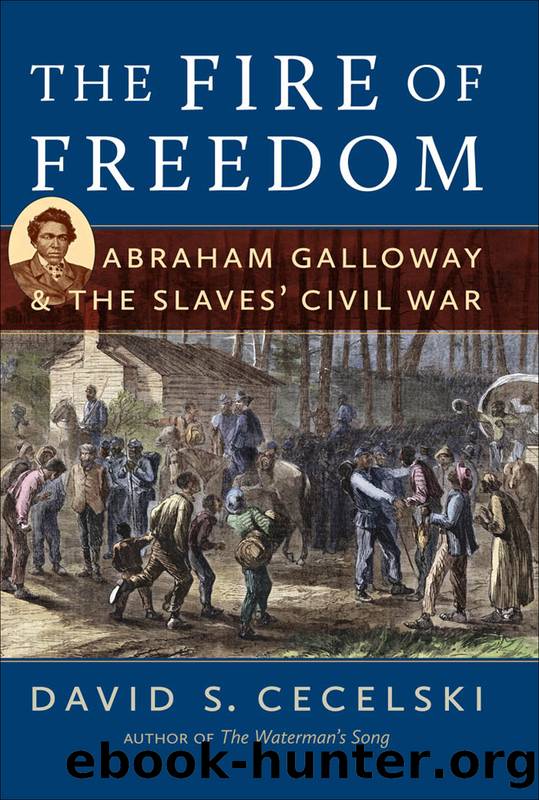The Fire of Freedom by David S. Cecelski

Author:David S. Cecelski
Language: eng
Format: epub
Publisher: The University of North Carolina Press
Published: 2012-01-15T00:00:00+00:00
12
In This Land We Will Remain
Less than two weeks after the Emancipation day celebration in New Bern, Union forces finally captured Fort Fisher. Not long after, they occupied Smithville, the village of Gallowayâs birth. The fall of Fort Fisher gave the Union control over the Cape Fear River and cut off the Confederacyâs last major supply line to Robert E. Leeâs troops in Virginia. The Unionâs military progress now proceeded swiftly. Shermanâs army had taken Savannah, Georgia, just before Christmas and would soon move northward through the Carolinas. African American activists felt the end of the slaveholding republic approaching rapidly. The warâs ultimate meaning, as a struggle for their liberation, also seemed clear to them. That was especially true after 31 January, when the U.S. Congress passed the Thirteenth Amendment to the Constitution: the amendment abolished slavery and involuntary servitude, except as punishment for a crime, throughout the country. Fifteen state legislatures ratified the amendment almost immediately.
While the Union and Confederate armies staggered to the warâs end, African Americans gathered in New Bern for a two-day celebration of the Thirteenth Amendment and its progress through the state legislatures. On 16 February, Galloway welcomed a standing-room-only crowd into Andrew Chapel. The Reverend James W. Hood, the presiding minister, called the house to order. The assembly named Galloway and the Reverend Isaac Felton honorary vice presidents for the celebration and, on Gallowayâs motion, accepted Hood as secretary. That night they sang hymns, beginning with âBlow Ye the Trumpet, Blowâ; heard a moving invocation by Reverend Felton; and listened to several speeches, including an opening oration by Galloway.1 The following night, New Bernâs black residents passed resolutions expressing their support for the Thirteenth Amendment.
Leaders of the AME Zion church played especially significant roles at those gatherings.2 Three of the seven committee members appointed to draft resolutions were AME Zion ministers, and the final resolutions strongly reflected their influence. The dominant theme was the guiding hand of a loving God over the affairs of men. âTo God we will give songs of praise,â they wrote, âand pay humble adoration to His glorious Name, who is the source of all our blessings, and who has put it into the hearts of our rulers to deal justly, love mercy, and work righteousness before all people.â3 Their words signaled their humbleness before God but also revealed a worldview shared by many southern blacks that interpreted their liberation from slavery, their survival, and the Union victory in terms of Old Testament prophecy and New Testament salvation and redemption. To the 4 million slaves in the South, the great African American historian W. E. B. Du Bois later wrote, âGod was real. They knew Him. They had met Him personally in many a wild orgy of religious frenzy, or in the black stillness of the night.â4
To guide their exodus from slavery, the gathering resolved, God had made âhis Excellency, Abraham Lincoln . . . the mainspring of the grand machinery which has worked out the freedom of millions of bondmen.
Download
This site does not store any files on its server. We only index and link to content provided by other sites. Please contact the content providers to delete copyright contents if any and email us, we'll remove relevant links or contents immediately.
| United States | Abolition |
| Campaigns & Battlefields | Confederacy |
| Naval Operations | Regimental Histories |
| Women |
In Cold Blood by Truman Capote(3374)
The Innovators: How a Group of Hackers, Geniuses, and Geeks Created the Digital Revolution by Walter Isaacson(3146)
Steve Jobs by Walter Isaacson(2889)
All the President's Men by Carl Bernstein & Bob Woodward(2363)
Lonely Planet New York City by Lonely Planet(2217)
And the Band Played On by Randy Shilts(2197)
The Room Where It Happened by John Bolton;(2150)
The Poisoner's Handbook by Deborah Blum(2135)
The Innovators by Walter Isaacson(2098)
The Murder of Marilyn Monroe by Jay Margolis(2095)
Lincoln by David Herbert Donald(1982)
A Colony in a Nation by Chris Hayes(1927)
Being George Washington by Beck Glenn(1912)
Under the Banner of Heaven: A Story of Violent Faith by Jon Krakauer(1788)
Amelia Earhart by Doris L. Rich(1689)
The Unsettlers by Mark Sundeen(1682)
Dirt by Bill Buford(1670)
Birdmen by Lawrence Goldstone(1662)
Zeitoun by Dave Eggers(1643)
